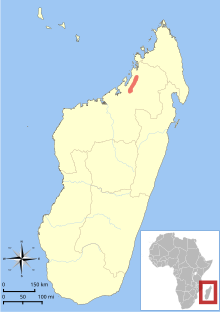| Grewcock's sportive lemur | |
|---|---|
| Conservation status | |
 Critically Endangered (IUCN 3.1) | |
| CITES Appendix I (CITES) | |
| Scientific classification | |
| Domain: | Eukaryota |
| Kingdom: | Animalia |
| Phylum: | Chordata |
| Class: | Mammalia |
| Order: | Primates |
| Suborder: | Strepsirrhini |
| Family: | Lepilemuridae |
| Genus: | Lepilemur |
| Species: | L. grewcockorum |
| Binomial name | |
| Lepilemur grewcockorum Louis et al.., 2006 | |

| |
| Distribution of L. grewcockorum | |
| Synonyms | |
|
L. manasamody Craul et al., 2007 | |
Grewcock's sportive lemur (Lepilemur grewcockorum), or the Anjiamangirana sportive lemur, is a sportive lemur endemic to Madagascar. It is a medium-sized sportive lemurs with a total length of about 55 to 63 cm (22 to 25 in), of which 26–30 cm (10–12 in) are tail. Grewcock's sportive lemur is found in northwestern Madagascar, living in dry deciduous forests.
Originally named L. grewcocki, the name was found to be incorrectly formed and was corrected to L. grewcockorum in 2009.
It was also found to be synonymous with the Manasamody sportive lemur (Lepilemur manasamody), known for its primarily grey-brown coloration and known only from Ambongabe and Anjiamangirana I (between the Sofia River in the south and the Maevarano River in the north). The decision was made because the sampling sites were within 2 km (1.2 mi) of each other, and no geographic barrier could be identified.
References
- ^ Louis, E.E.; Bailey, C.A.; Sefczek, T.M.; Raharivololona, B.; Schwitzer, C.; Ratsimbazafy, J.; Wilmet, L.; Radespiel, U. (2020). "Lepilemur grewcockorum". IUCN Red List of Threatened Species. 2020: e.T136771A115585939. doi:10.2305/IUCN.UK.2020-2.RLTS.T136771A115585939.en. Retrieved 19 November 2021.
- "Checklist of CITES Species". CITES. UNEP-WCMC. Retrieved 18 March 2015.
- Louis Jr., E.E.; Engberg, S.E.; Lei, R.; Geng, H.; Sommer, J.A.; Ramaromilanto, R.; Randriamanana, J.C.; Zaonarivelo, J.R.; Andriantompohavana, R.; Randria, G.; Prosper; Ramaromilanto, B.; Rakotoarisoa, G.; Rooney, A.; Brenneman, R.A. (2006). "Molecular and morphological analyses of the sportive lemurs (Family Megaladapidae: Genus Lepilemur) reveals 11 previously unrecognized species" (PDF). Texas Tech University Special Publications (49): 1–49.
- ^ Garbutt, Nick (2007). Mammals of Madagascar, A Complete Guide. Yale University Press. p. 128. ISBN 9780300125504.
- ^ Hoffman, M.; Grubb, P.; Groves, C.P.; Hutterer, R.; Van der Straeten, E.; Simmons, N.; Bergmans, W. (2009). "A synthesis of African and western Indian Ocean Island mammal taxa (Class: Mammalia) described between 1988 and 2008: an update to Allen (1939) and Ansell (1989)" (PDF). Zootaxa. 2205: 1–36. doi:10.11646/zootaxa.2205.1.1.
- Mittermeier, R.A.; Louis, E.E.; Richardson, M.; Schwitzer, C.; et al. (2010). Lemurs of Madagascar. Illustrated by S.D. Nash (3rd ed.). Conservation International. p. 232. ISBN 978-1-934151-23-5. OCLC 670545286.
- Mathias Craul; Elke Zimmermann; Solofo Rasoloharijaona; Blanchard Randrianambinina; Ute Radespiel (2007-05-31). "Unexpected species diversity of Malagasy primates (Lepilemur spp.) in the same biogeographical zone: a morphological and molecular approach with the description of two new species". BMC Evolutionary Biology. 7 (1): 83. Bibcode:2007BMCEE...7...83C. doi:10.1186/1471-2148-7-83. PMC 1913500. PMID 17540016.
| Taxon identifiers | |
|---|---|
| Lepilemur grewcockorum | |
This lemur-related article is a stub. You can help Misplaced Pages by expanding it. |